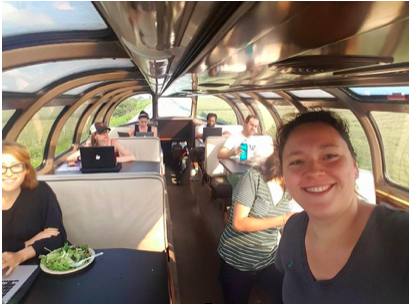
A panoramic view of the World War II Veteran’s Memorial in Washington, DC taken during the seminar bus tour
For nearly 30 years as a U.S. Senator representing Arkansas, J. William Fulbright called Washington, DC his home.
A city of tremendous power, wealth, and intelligence also grappling with trials of corruption, inefficiency, and a tumultuous political and media landscape, within the heart of the nation’s capital the senator worked tirelessly to establish an international exchange program which would eventually bear his name: The Fulbright Program.
From April 13 – 17, 2016, over 130 foreign Fulbrighters hailing from nearly 65 countries continued this legacy imparted by the late Senator and immersed themselves in the allure and charm of Washington, DC. In discussion they challenged each other’s thoughts around the topic of “U.S. Elections and Media” and “Polarization and U.S. Politics.” In service they took to the streets and streams of the DMV (District of Columbia, Maryland, Virginia) zones to participate in the Annual Potomac Watershed Clean Up in partnership with the Alice Ferguson Foundation. And in community they came together in a memorable U.S. Election Simulation Workshop to demonstrate vast political knowledge and prowess under real pressure.
The seminar opened at the Willard Intercontinental Hotel’s Grand Ballroom with remarks shared by both Mary E. Kirk, Director of the U.S. Department of State’s Office of Academic Exchange Programs and Mala Adiga, Deputy Assistant Secretary of State for Academic Programs. Joseph Trippi, a DC-based political consultant, provided analysis and prediction on the current U.S. presidential election during the evening’s keynote address.
DC’s prime political and media topography allowed for top consultant and journalist voices to inform the conversation throughout the week’s panel discussions. Moderated by Jeremy Mayer, Associate Professor in the School of Policy, Government, and International Affairs at George Mason University, “Polarization and U.S. Politics” included lively conversation between former Missouri governor, Matt Blunt, and political analyst Jamal Simmons.
Panelists within the “U.S. Elections and Media” discussion were pressed with challenging questions regarding the state of small town journalism and political accountability, the new media paradigm, and the altered relationship between the politician and the journalist due to 24-hour reporting.

An evening of home hospitality provided by Institute of International Education CEO, Allan Goodman
Jorge Ivan Caraballo Cordovez, Fulbright student from Colombia studying journalism at Northeastern University, suggested that, “as journalism is being decentralized, new companies are being based in New York, San Francisco, for journalists who have had high education.” In turn, many of the cities of the U.S. which used to have local newspapers are losing accountability and oversight. “What will be the impact of this trend…on American cities?” he asked.
Suzy Khimm, a prominent journalist based in Washington, DC, agreed that local politicians in those cities “…don’t have eyes on them,” which could scale to large corruption problems at the state and national level. “There hasn’t been a profit motive for a way for people to fix this,” she noted.

Fulbrighters enjoying a sun-filled morning of community service trash clean up at the Metropolitan Police Department, District 5 in Washington, DC
Fulbrighters were able to contextualize much of their discussions in one of DC’s most popular museums: The Newseum. The young museum – whose space invites a deep appreciation of the U.S. first amendment and global free speech – hosts an impressive array of iconic journalism and news-related material, including comedian Jon Stewart’s nightly news desk, a large segment of the Berlin Wall, as well as troves of famous New York Times front pages dating back to the mid-19th century. In particular, Fulbrighters were drawn to The Newseum’s most recent exhibit, “CNN Politics Campaign 2016: Like, Share, Elect,” an interactive digital playground of data-informed commentary on the current presidential campaign. The exhibit provided a unique immersive experience demonstrating the ways digital and social media have transformed how candidates campaign, how journalists cover elections, and how the public participates in the political process.

Presidential candidates Thor Gunnarsson, Iceland (left) and Chona Camille Vince Cruz, Philippines, exchange remarks on immigration and environmental policy during the U.S. Election Simulation Workshop debate
In the outdoors students took part in the 28th Annual Potomac River Watershed Cleanup across three distinct sites in DC, Virginia, and Maryland. In partnership with the Alice Ferguson Foundation Fulbrighters made up a group of thousands of volunteers helping to transform and preserve the natural beauty of the area. Sites include the Historic Holmes Run, Northeast DC, and Hard Bargain Farm in Accokeek, Maryland. The latter included a newly designed, 100% ecologically-sound building set on 300-sprawling acres of fertile land beside the Potomac River.
The seminar’s crowning moment came in the final hours of the U.S. Election Simulation Workshop and announcement of the presidential victor. In practice, students were able to role play as Electoral College voters for every one of America’s 11 swing states of the 2016 election. The two presidential candidates’ teams were tasked with convincing voters to select them based on two major challenges: immigration and the environment. And in an adrenaline-filled debate between two articulate and passionate candidates – Thor Gunnarsson, Iceland and Chona Camille Vince Cruz, Philippines – Chona was selected by her peers as the presidential winner!
It was a great time and we enjoyed seeing you all in Washington, DC!


No Comments